Iran Summary – November 2021
About the Iran Summary: The Jewish Institute for National Security of America’s (JINSA) Gemunder Center produces a monthly tracker providing timely information and graphics illustrating Iran’s aggressive and destabilizing activities.
November 2021 Summary: Negotiations to revive the Joint Comprehensive Plan of Action (JCPOA) nuclear agreement resumed at the end of November, amid an escalation of Iranian-backed regional aggression. U.S. officials have previously expressed frustration that the talks had not progressed and suggested the need to develop a “Plan B,” but have not detailed what that would entail. Iran has blocked international inspectors from accessing its Karaj centrifuge assembly plant. Meanwhile, and Israeli intelligence suggests Iran is preparing to enrich uranium to weapons grade (90 percent).
Regional Aggression: Iran and its partner militias significantly escalated their aggression in the Middle East, including a brazen drone strike on the Iraqi prime minister, multiple attacks on Saudi cities and infrastructure, and naval harassment in international waters. Iranian-backed groups fired forty-seven munitions at U.S. service members, partners, and interests, including thirty-three drones, according to JINSA’s Iran Projectile Tracker.
- U.S. and Israeli officials who spoke with The New York Times revealed that the attack in October on U.S. forces at Tanf, Syria was retaliation for Israeli airstrikes in Syria.
- Kataib Hezbollah and Asaib Ahl al-Haq, Shiite militias backed by Iran, launched armed three drones against the residence of Iraqi Prime Minister Mustafa al-Kadhami on November 7.
- Iran finished Zolfaghar-1400, a three-day war game, on November 9 that included conventional navy, army, air force, and air defense forces testing cruise missiles, torpedoes, and suicide drones in the Strait of Hormuz, Sea of Oman, Red Sea, and Indian Ocean.
- On November 10, Houthi rebels occupied the U.S. embassy in Sana’a, Yemen and took U.S.-employed security personnel hostage. The United States suspended its diplomatic mission in Sanaa in 2015 when the Houthis took control of the city.
- An Iranian naval helicopter unsafely circled the USS Essex in the Gulf of Oman on November 11.
- Iran’s Islamic Revolutionary Guard Corps announced on November 20 that they seized a foreign ship in the Gulf it claimed was smuggling diesel and detained the crew for interrogation but did not provide details on the vessels nationality or when the seizure took place.
- Houthi fighters partnered with Iran gained ground in Yemen during mid-November after Yemini forces backed by Saudi Arabia and the United Arab Emirates withdrew from key areas near the western port city of Hodeidah. The shift allowed the Houthis to reopen the road from Hodeidah to the capital Sanaa.
- Bahrain’s interior ministry said on November 22 that its security forces foiled a planned attack by arresting an unspecified number of suspected militants and weapons that came from Iran.
- On November 23, Israeli Defense Minister Benny Gantz claimed that Iran relied on two drone bases at Chabahar and Qeshm Island to launch recent attacks at sea.
- Gantz also revealed that Iran tried to transport TNT from Syria to the West Bank via a drone in 2018.
- On November 20, the U.S. House Foreign Affairs Committee introduced the bipartisan Stop Iranian Drones Act, which would add sanctions under the Countering America’s Adversaries Through Sanctions Act (CAATSA) for “the supply, sale or transfer to or from Iran of unmanned combat aerial vehicles.”



Nuclear: The United States and Iran began the seventh round of indirect negotiations to return to the JCPOA in Vienna on November 29, after the sixth round ended inconclusively in June.
- On November 3, European Union representative Enrique Mora announced a seventh round of negotiations to revive the JCPOA in Vienna would begin on November 29. Iran had agreed to another round of talks at the end of October.
- Iran’s Atomic Energy Organization claimed it had stockpiled over 210 kilograms of twenty percent enriched uranium and 25 kilograms of sixty percent enriched uranium, “But such declarations are mere bluster meant to extract U.S. concessions and obscure serious setbacks in Iran’s nuclear program,” according to JINSA’s Blaise Misztal and Jonathan Ruhe.
- On November 8, Iranian Foreign Ministry spokesperson Saeed Khatibzadeh argued that the United States “must lift the oppressive sanctions completely and effectively” and “guarantee that no administration in the United States mocks the world and international law” by leaving the nuclear agreement again.
- S. national security adviser Jake Sullivan proposed the idea of an interim nuclear agreement with Iran to Israeli officials during mid-November.
- Iran resumed production of key centrifuge parts at its centrifuge assembly plant in Karaj.
- Rafael Grossi, head of the International Atomic Energy Agency (IAEA), failed to reach a deal to allow inspectors access to the Karaj plant during a visit to Iran on November 22-23. While neither the IAEA nor Iran have confirmed the resumption of production at Karaj since June, Grossi warned that a lack of access to the site would soon prevent the watchdog organization from providing assurances about the material there.
- In the leadup to the seventh round of JCPOA talks in Vienna, Israeli leaders expressed concerns about Iran’s nuclear progress and expressed the need to maintain Israel’s freedom of action regardless of the outcome of the talks.
- In a speech on November 23, Israeli Prime Minister Naftali Bennett claimed, “There may also be disagreements with the best of our friends. It would not be the first time. In any event, even if there is a return to the JCPOA, Israel obviously is not a party to the agreement and is not obligated by it…. The mistake we made after the first agreement in 2015 will not be repeated. Then, despite all the noise beforehand, once the agreement was signed, it affected us like a sleeping pill. The State of Israel simply went to sleep. We were occupied with other things. We will learn from this mistake. We will maintain our freedom of action.”
- Israeli Finance Minister claimed during a speech on November 23 that Iran will have a nuclear bomb within five yearsregardless of nuclear negotiations and that Israel may need to use military force even if it lacks the support of its allies.
- A senior Israeli official told the Wall Street Journal that “Israel is very concerned that the U.S. is setting the stage for what they call a ‘less for less’ agreement…. Such an agreement would be detrimental and would only benefit the Iranian regime…It would be an enormous gift to Iran’s new, radical and IRGC affiliated regime.”
- In the final few weeks of November, Israel reportedly shared intelligence with U.S. and European officials that Iran is preparing to enrich uranium to ninety percent purity, the level it would need to produce a nuclear weapon. There is no civilian purpose for enriching to ninety percent.
- S. and British negotiators appeared to share concerns about Iran’s stalling, even as they resumed negotiations.
- S. Iran Envoy Robert Malley said on November 28, “if Iran thinks it can use this time to build more leverage and then come back and say they want something better, it simply won’t work. We and our partners won’t go for it.”
- After meeting with Israeli Foreign Minister Yair Lapid, British Foreign Secretary Liz Truss said the seventh round of talks is “the last opportunity for the Iranians to come to the table…. We want those talks to work…. But if they don’t work, all options are on the table.”
Cyber: Announcements about Iranian cyber activities during November stressed the vulnerabilities that foreign companies face from Iranian hackers and the threat that Iranian disinformation poses to the democratic process in the United States and partner nations.
- November 16, Microsoft revealed that six Iranian groups had conducted ransomware attacks since September 2020.
- On November 18, the United States sanctioned six Iranian individuals and one entity for attempting to influence the 2020 U.S. presidential election through disinformation on websites and social media.
- A joint alert from the U.S. Department of Homeland Security, the FBI, the Australian Cyber Security Center, and the UK’s National Cyber Security Center warned that hackers “associated with the government of Iran” are targeting transportation, health care and public health sectors. The cyber-attacks exploited enterprise products from Microsoft and Fortinet.
Domestic/Human Rights:
- S. Secretary of State Antony Blinken announced the designation of Iran, China, Eritrea, North Korea, Pakistan, Russia, Saudi Arabia, Tajikistan, and Turkmenistan “ as Countries of Particular Concern for having engaged in or tolerated ‘systematic, ongoing, and egregious violations of religious freedom.’”
- After two weeks of thousands of farmers and their supporters in Isfahan protesting water shortages, Iranian security forces violently cracked down on November 26. The Iran Meteorological Organization estimates 97 percent of the country suffers from drought.
- Videos show security forces wielding batons, shields and guns attacking and potentially killing protestors. Iran Human Rights, an Oslo-based non-profit organization, reported that at least than 120 people were arrested in Isfahan, three of whom may have been killed.
- The government eventually tried to block the reporting of the protests by apparently cutting off mobile and internet service.
- Employees at Iran Khodro Khorasan Company, the largest car manufacturer in Iran, went on strike as four thousand workers of the company are protesting against forced overtime hours and low wages.
Recent JINSA Publications on Iran:
- November 12: “Brazen Drone Strike Against Iraqi Prime Minister,” Ari Cicurel, JINSA National Security Brief
- November 18: “U.S. & Israel “Plan B” for Iran,” Jonathan Ruhe, Ari Cicurel, Andrew Ghalili, JINSA National Security Brief
- November 22: “A Better Path Forward for Handling Iran,” Michael Makovsky, Newsweek
- November 29: “Setting a Deadline for U.S.-Iran Nuclear Talks,” Blaise Misztal and Jonathan Ruhe, JINSA National Security Brief
- December 1: “Iran negotiations need clear end date for any agreement,” Blaise Misztal and Jonathan Ruhe, The Hill